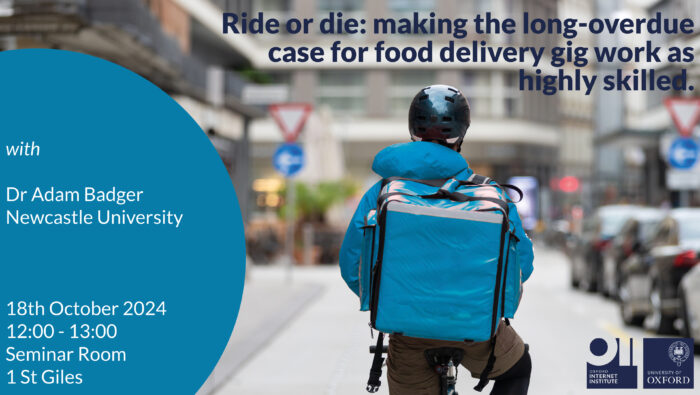
Dr Adam Badger
Former Research Associate
Adam Badger was a Postdoctoral Researcher at the Oxford Internet Institute, researching working practice in the global gig economy as part of the Fairwork project.

There has been a proliferation of academic work surrounding the so-called ‘gig-economy’. With some notable examples, much of this corpus of literature takes for granted the lowly-skilled nature of the tasks, and the de-skilling potential digital platform tools have. For example, the ILO’s International Standard Classification of Occupations (ISCO) has no entry for platform work, but those forms that are closest in substance (messengers, package and luggage porters and deliverers” and “hand or pedal vehicle drivers) are categorised as “elementary occupations”. In other words, the “lowest” skilled of all. Whilst these classifications clearly demonstrate that no-one in the ILO has ever actually been a gig worker, they also perpetuate a far more pernicious sentiment in our collective imaginary of platformised work. That it is low-skilled, and thus low-valued. In combination with gig workers’ invisibilised status – rendered invisible by the work, but also compounded by their race, migration status and frequently low-levels of formalised education – this results in an acceptance of the low pay and poor conditions these workers endure.
Based-upon nine-months of covert ethnographic research as a food delivery worker in London and eighteen months of overt research with a trade union organising gig workers across the UK, this paper argues that food delivery gig work can – in fact – be highly skilled. In doing so, it re-draws widely held misconceptions within and beyond the academy of these forms of work and demonstrates the highly skilled nature of the task at hand – especially so given the time and financial pressures these workers are under. It is worthy of note that many other ethnographic studies that do not conceptualise these workers as highly skilled have been undertaken by academics or researchers not reliant-upon the income this job generates, and thus able to not rush, or develop the corporeal knowledges required to undertake the job safely and successfully.
It is not shy in its ambition to totally re-cast the way many researchers view platform workers and the increasing encroachment of work into technology. It calls directly for an end to academic complicity in the narrative that these workers are somehow low-skilled. It is hoped that this perspective will give renewed vigour to attempts to organise workers and stake claims around negotiations with firms based on a compelling case for the work as a skilled endeavour. When we understand skill as a separate category to replaceability (the two are often confused in practice) then we can drive new directions for worker organising and research support in the future.